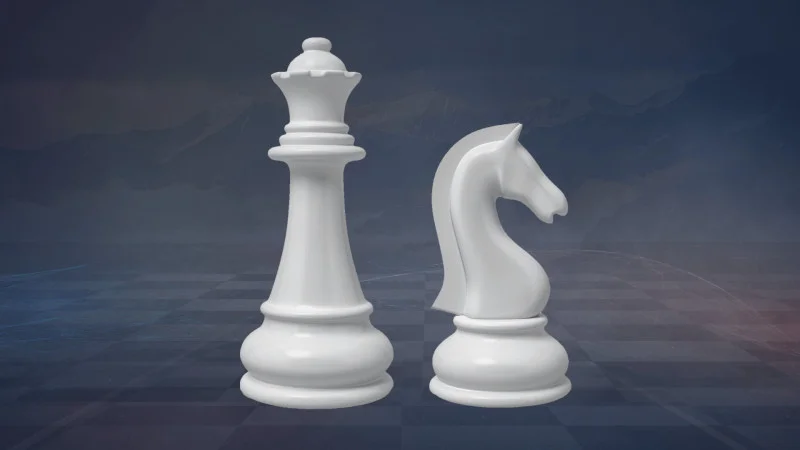Knight & Queen: A Powerful Attacking Team
In this example-packed article, GM Hellsten explains how the powerful team of a knight and a queen can combine as a deadly attacking force.
In this example-packed article, GM Hellsten explains how the powerful team of a knight and a queen can combine as a deadly attacking force.

Let’s think for a moment about how the pieces in our game complement each other. A Rook and a Bishop move in completely different ways, so they usually work very well together in the endgame.
For similar reasons, a Bishop and a Knight cooperate beautifully in many positions, not to speak of the Bishop pair. In any position, two Rooks on the 7th rank is a devastating force. And on a good day, 2 connected passed Pawns can surpass an entire Rook.
As for the Queen, often she is very powerful on her own. However, a great companion for her at any stage of the game is the Knight.
Many years ago, José Raúl Capablanca stated that a Queen and a Knight make a strong team, and his viewpoint has kept its validity over the years.
One simple explanation is that the Knight is the only piece that moves in a way, in which the Queen doesn’t.
In this article, I’ll share some examples where the powerful team of Queen and Knight had a key role in the attack.
Let’s start with a simple one:

White to move
White has more than one path to victory here. Still, Anand chose the most beautiful way:
36.Na6! Qxh4 37.Qf8+ Kd7 38.Nc5 mate.

A very nice mate! Note that when delivering mate, the Queen and Knight are often placed on squares of the same color, like f8 and c5 on this occasion, in order to control more squares.

Black to move
In an innocent-looking endgame, Black finds a way to launch a strong attack.
30...f5! 31.gxf5+
31.Qg3 was better, although after 31...Nb6 heading for c4, Black would keep excellent winning chances.
31...Qxf5 32.Qxb7 Qf1+ 33.Kd2 Nb6!
The team of Queen and Knight steals the show.
34.Qxc6+ Kf5

Anand's mating pattern is just around the corner, and unfortunately for White, he has run out of Queen checks.
35.c4 Nxc4+ 36.Kc3 Qf3+
White resigned in view of 37.Kb4 Qxa3+ 38.Kb5 Qa5 mate, another nice picture.

Black to move
Black is under pressure, but applying the same mating motif he managed to save a draw.
30...Qe1!
30...Nf4?! 31.Qxc7 Rd8 32.d5 would leave White clearly better. Remember that the value of the Pawns increases further into the endgame!
31.Qh8+ Kf7 32.Qxb8 Qc1+ 33.Kd3 Nf4+ 34.Ke3 Ng2+!

The engine also suggests 34...Qe1+ 35.Kxf4 Qxd2+ 36.Kf5 Qh2! aiming for a perpetual, but that’s not easy at all for a human to visualize over the board!
35.Ke2 Nf4+ 36.Ke3 Ng2+
Draw agreed.

Black to move
When Queen and Knight combine for an attack, all kinds of mating motifs can appear on the board. Here Rublevsky spots a rather unusual one.
39...Rxh3+! 40.Kxh3
After 40.gxh3 Nf3+ 41.Kh1 Nxe1, again mate is around the corner.
40...Qh5+ 41.Kg3 Nf5 mate.
In the game, Morovic had already resigned after 39...Rxh3+.

White to move
Here is a more complex case where the team of Queen and Knight works with multiple mating motifs.
31.f6+! Kxf6 32.Nf5!
Establishing the threat of 33.Qe7+ Kg6 34.Qxg5+ Kh7 35.Qg7 mate. Worse is 32.Qf5+?! Ke7 33.Qxg5+ Kd7 and the black King escapes to safer soil.
32...Kg6
Black could avoid the aforementioned mate on g7 by 32...Qh8 33.Qe7+ Kg6 34.Qxg5+ Kh7, however then White delivers a different one: 35.Qh6+! Kg8 36.Ne7 mate.
33.Nxd6+!

Here Black resigned, but let us make a few more moves.
33...Kh6
33...Kf6 34.Ne8 mate is another elegant picture, isn’t it?
34.Nf5+ Kg6
Or 34...Kh7 35.Qe5 with a similar situation.
35.Qc6+ Kh7 36.Qf6!
The mate on g7 is inevitable.

White to move
In a typical Sicilian battle, Black has neglected development and is now punished by a queen and Knight in tandem.
15.e5! dxe5 16.Ng4!
Another way to the goal was 16.fxe5!? Qxe5 17.Ng4! Qc5+ 18.Kh1 Nxd3 19.Nxf6+ gxf6 and here, instead of reestablishing the material balance with 20.cxd3?, White would go for mate with 20.Ne4! Qe5 21.Nxf6+ Kg7 22.Qxh7 mate.
16...Nxd3 17.Nxf6+ gxf6 18.Ne4!

One Knight left, another one arrives. Not 18.cxd3? f5 and Black survives.
18...Nxf4 19.Rxf4
Getting rid of the last defender.
19...exf4
Here Black resigned for obvious reasons.
20.Nxf6+ Kg7 21.Qg5+ Kh8 22.Qh6
The only way to avoid mate on h7 is now 22...Qxc2, but then follows 23.Qxf8 mate instead.

White to move
Here Black has just moved their Bishop from g7 to d4, creating the threat of mate in one. Relying on the team of Queen and Knight, White rejects the enemy attack and goes for the black King!
35.Rxd4! cxd4 36.Qc8+ Ke7 37.Nf5+ Kf6 38.g4!!

A beautiful move that introduces the threat of 39.Qd8+ Kg6 40.Qg5 mate, among other things.
38...Re1+ 39.Kf2 Re4?
Omitting the aforementioned threat, but also after 39...Qh2+ 40.Kxe1 Qg1+ 41.Kd2 Qf2+ 42.Kd1 Qf1+ 43.Kc2 d3+ 44.Kb3 White would win.
40.Qd8+
Black resigned.

White to move
In this rather chaotic position, White spots a distant mating motif with the Queen and the Knight.
56.Qa1! Bxa2
56...Ba6 57.Rxc8+ Kxc8 58.Qh8+ would lead to exactly the same thing.
57.Rxc8+ Kxc8 58.Qh8+!

From here on, all White has to do is approach their Queen to the mating square on e8.
58...Kd7 59.Qg7+
In view of 59...Ke8 60.Qf8+ Kd7 61.Qf7+ Kc8 62.Qe8+ Black resigned.

White to move
Even the world’s best players sometimes forget about the dangerousness of the Queen and Knight team.
34.Qd1?
Safety could be reached by 34.Qf1 Qe6 35.Rc1, while the engine even suggests the cool 34.Qxb4!? Ne4 35.Bb6.
34...Rd5! 35.Rd4
It seems that White is about to simplify into a better endgame, however...
35...Ne4!

Ouch! Suddenly there is no good defense against the threat of 36...Qxf2+ 37.Kh1 Nxg3 mate.
36.f3 Qe5!
Very nice, White is unable to defend g3 and d4 at the same time.
37.Rxd5
No better is 37.fxe4 Rxd4 or 37.Rxe4 Rxd1+.
37...Qxg3+
Black gives mate on f2 next move. In fact, Giri had already resigned after 36...Qe5.

White to move
At first sight, White appears to be in huge danger. Not only is 19...c2 in the air, an even stronger threat exists: 19...Qd2+! 20.Rxd2 Rb1+ with mate.
Fortunately, there’s a move that defends against both threats, and also wins the game!
19.Bd3! Bxd1
This loses on the spot, but also after 19...Ke7 20.f3 Be6 21.O-O White should win without major difficulties.
20.Qc8+ Ke7 21.Nf5+ Ke6 22.Qc6
What a nice mate!

These examples should help you to spot Queen and Knight mating motifs in your own games, and inspire you to victory!
I hope you’ve enjoyed this article.
You can also check today’s Daily Lesson with a Grandmaster, where I show another nice example on this topic.
Good luck using your Queen and Knight team in future attacks?
P.S. Feel free to share your thoughts and ask any questions about this article in our forum.
Originally published Feb 16, 2021

